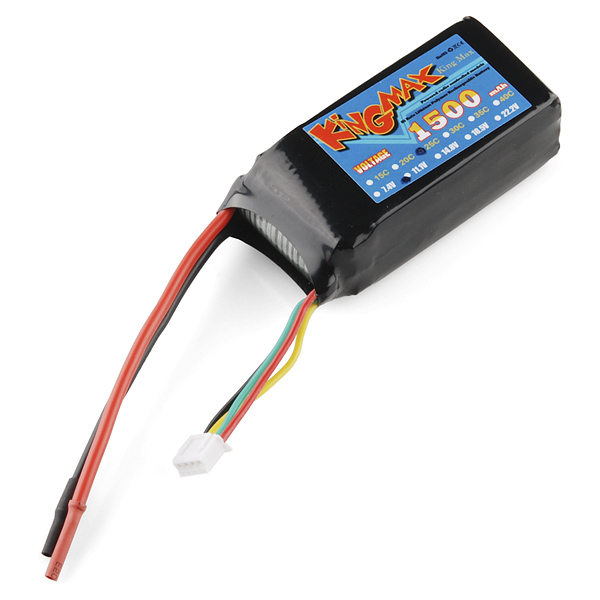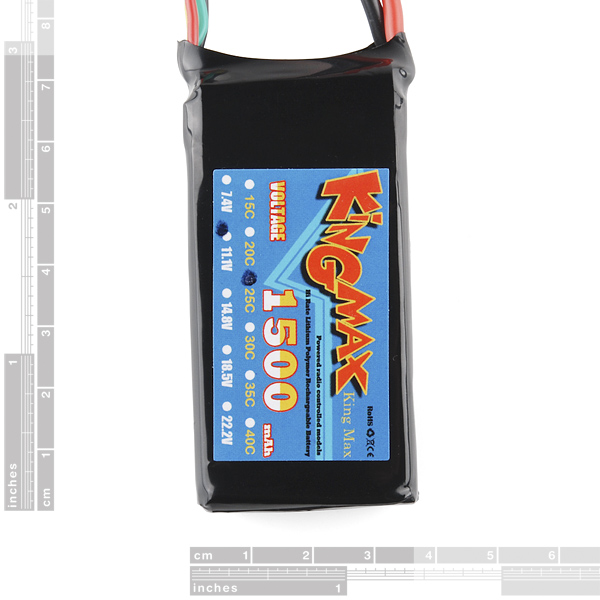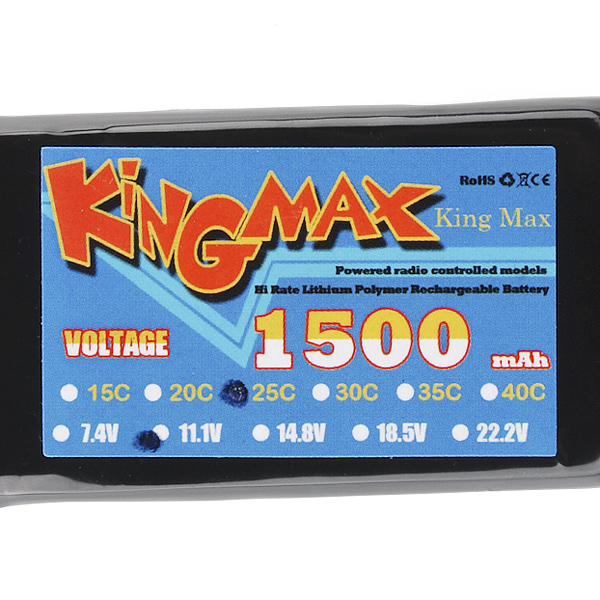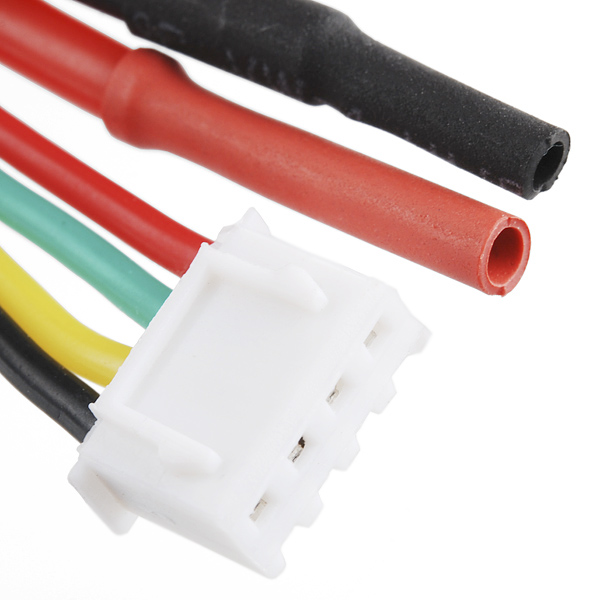Polymer Lithium Ion Battery - 1500mAh 11.1v
This high discharge LiPo is a great way to power any R/C, robotic, or portable project. This is an excellent choice for anything that requires a small battery with a lot of punch. The voltage is low enough not to tax your regulating circuits, and the discharge rate is high enough to accommodate a lot of electronics and a few small motors.
The battery has three cells and outputs 11.1V storing 1500mAh of charge. Because this is a triple cell battery pack, a special charger is needed. This battery is not compatible with single cell chargers. A compatible charger is listed below.
Note: Due to shipping restrictions, only two batteries can be shipped together at one time. We should be able to ship more than two batteries at a time by the end of 2014.
Note: Care should be taken not to short circuit or overtax these batteries because they don't have any built-in protection circuit.
**Weight: **114g (4oz)
- 11.1V 3-cell pack
- 1500mAh of charge
- 20C continuous discharge rate
- JST-XH charge plug
- 14AWG bare discharge leads
- 71.6mm x 34.5mm x 22mm
- [MSDS](http://cdn.sparkfun.com/datasheets/Prototyping/Lithium Ion Battery MSDS.pdf)
Polymer Lithium Ion Battery - 1500mAh 11.1v Product Help and Resources
Core Skill: Electrical Prototyping
If it requires power, you need to know how much, what all the pins do, and how to hook it up. You may need to reference datasheets, schematics, and know the ins and outs of electronics.
Skill Level: Rookie - You may be required to know a bit more about the component, such as orientation, or how to hook it up, in addition to power requirements. You will need to understand polarized components.
See all skill levels
Comments
Looking for answers to technical questions?
We welcome your comments and suggestions below. However, if you are looking for solutions to technical questions please see our Technical Assistance page.
Customer Reviews
No reviews yet.





Hi, any chance of knowing when these are coming back in stock?
Plz help me i want to connect to el sequencer to polymer lithium ion battry-1500mAh 11.1v
Will this run an Arduino Uno, EL Escudo 12v AC inverter and 8 (3m long) EL wires? With all of the variables, I'm having trouble deciding. How long might it last, also. Minutes, hours, days?
It should work fine. As for how long it depends on a lot of factors, but lets say your Arduino is using 5mA and the EL wire another 10mA. That leaves you with 100h. Check out exactly how much power EL wire uses and go from there. If you have any other questions feel free to email techsupport@sparkfun.com
Can i use the white header as the voltage output instead of the red and black wire? I plan to use it to power my servo and the red/black wire as other purpose
el cargador de esta bateria donde lo consigo
Is there a connector you recommend for the 14AWG bare discharge leads? I assume I could just attach male headers to my perf board, but that wouldn't offer any polarity protection and I assume there's a more elegant solution? I've been collecting various sizes of LiPo batteries and have collected mini-JST connectors for the 1S ones, regular JST connectors for the 2S ones, an XT60 connector for the 4S ones, but I'm not sure what connector I should get for these 3S ones.
I used to use Radio Shack "molex" type connectors (labeled "9.6V" but really, run what you want,) and they work, but they are a bit bulky, and there is a small risk of connecting them with inverse polarity. These are readily available and easy to work with, so you might want to consider those.
I have since switched over entirely to "Deans" style T-connectors. They are rated for 50A, and are impossible to connect with inverse polarity. Typically, they are made from a nylon housing, and the connector blades grip very well without additional retainers. Another popular connector in this class is XT-60, which you can find here on SparkFun, and in many hobby stores on- and off-line.
It's also important to run as short cables as you can, and use low-gauge stranded cables when running any longer runs. A 4" run could probably be done with 20ga solid cable, but a 1ft run should be 16ga twisted to avoid unnecessary voltage drop and heat buildup.
Finally, make sure you properly heat-shrink the connector. Put on the heat shrink before you solder the connector! Nothing sucks worse than welding your power connectors to some piece of metal and ruining the battery pack in a shower of sparks because you didn't insulate it properly...
What is the maximum current draw on this battery? Also, what is 20C continuous discharge rate?
Thank you in advance to anyone who knows the answers.
My understanding is that 20C means the battery can continuously discharge at a rate of 20 times its capacity. Since this is a 1500mAh battery, that means it could discharge at up to 30amps (20 x 1500mA). The enormous discharge rate of LiPo batteries is what I think makes them so compelling compared to other portable batteries. e.g. Sparkfun sells the 7.4v 500mAh Lipo for $4.95, which is about the cost of a 9v disposable alkaline battery, which has about the same capacity (~500mAh). The LiPo battery is physically slightly smaller and of course is rechargeable, but I think the best aspect is that it is 25C, which means it can discharge at 12.5A! I believe the alkaline 9V is closer to 1C, and is designed to be discharged at about 15mA according to battery websites.
There is no protection circuitry. If you run these batteries down they are gone.
I accidentally left this one on again, running a wifi router. Now the 'outer' two cells show 2v each, the 'middle' cell shows 0v. Ouch. This happened once before, this time I bought two batteries. Looks like I need some sort of cut-out circuit.
What are the charger settings for the Imax charger? I just got one of these to build the awesome horn prank.... I'm charging it right now (and you do need to hook up the large leads with the Imax charger) at .5 amps just to be safe... but should I be using a higher setting?
I have read that you can safely charge a LiPo at a maximum rate of 1C, so if you have a 1500 mAH battery, then you should not exceed 1.5A if charge current. The maximum charge voltage per cell, I have read, is 4.2V. As always, if the battery gets hot while charging, stop the charging process, as it means something is wrong.
Just wondering how stable the 11.1V is. I'm considering using this to power your 12V EL wire power inverter for my costume for Halloween. I'm a little weary tho, because the inverter data sheet says 11V min. So I'm wondering if it would be safe trying to power it and say 50 ft of wire.
Hi I fly rc planes and use a lot of these type batteries, there fully charged voltage is 12.6 and the c20 rating means you can pull 20x 1.5 amps or 30 amps from one pack like this as far as being safe you should read up on lipo batteries before you ever use or try rechanging one there are certain inherent dangers in the use of these type batteries like bursting into flames and shooting fire out of them at a radius of approx 5 feet so use with great care.
Can I recharge this battery with a solar panel while it is being used?
What kind of warranty do these carry? And has anyone used them as an actual RC pack? This is a slamming deal for this type of battery( I just paid $35 for a 1350mah pack, but it has a 40c discharge rate), which makes me wary of the QC on these...
Is there any low voltage protection built into this pack or do I need to keep a close eye on battery cell voltage?
All of our cells have a protection circuit.
I recently bought one of these cells and they do not have protection circuitry.
Can you give some specs on the circuit?
Please confirm this. I recently ran one of these packs down to five volts, and while i managed to recover it, at no point did it act like it had any kind of protection circuit.
I ran it down but was not able to recover it. Looks like I may have done that again.
what is the four pin connector for?
The 4-pin JST-XH connector is for charging. It allows the charger to drive each cell individually. The two large leads are for connecting the load - they are not used during charging.
Actually many chargers will charge through the main "discharge plug as well" and only balance through the 4 pin connector.
The main connector has all the cells wired in series and can carry the full discharge rate, the smaller multi-pin plug has pairs wired to each cell, so that you can monitor each cell voltage independently while charging. This is also used by the charger to draw down a cell that is slightly higher in voltage while charging so that it will end up balanced across the pack.
You can read more on various RC forums if you wish
I just got the recommended charger (https://www.sparkfun.com/products/10473), and it requires connection to the "discharge" connector even when balancing. I might hook up an ammeter to determine if the main charge current is flowing through that. Might be it just bypasses at the JST connector to maintain balance.
Thanks for the reply both